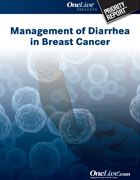Publication
Video
Dr. Dietrich on Optimal Adverse Event Management for Neratinib in Breast Cancer
Author(s):
Martin Dietrich, MD, PhD, medical oncologist, Advent Health Cancer Institute, discusses management of diarrhea, an associated adverse event of neratinib, following data from the CONTROL trial in patients with HER2-positive breast cancer.
Martin Dietrich, MD, PhD, medical oncologist, Advent Health Cancer Institute, discusses management of diarrhea, an associated adverse event (AE) of neratinib, following data from the CONTROL trial in patients with HER2-positive breast cancer.
Diarrhea is the most common on-target effect of neratinib treatment. When Dietrich speaks to patients who are about to go on neratinib, he informs them about the side effects that need to be recognized, specifically mentioning diarrhea. For patients who have had neratinib recently, Dietrich talks about the additional strategies to control the diarrhea. According to Dietrich, the body undergoes an adjustment and the diarrhea become less frequent and less intense.
Based on the CONTROL trial results, Dietrich's practice adopted a combination of loperamide and colestipol, sometimes adding budesonide, as a baseline regimen to control the diarrhea AE, which is cost-effective and tolerated by patients. The mechanism causing the diarrhea, whether inflammatory or secretory, is not currently known. However, results suggest it is a combination of both factors.










